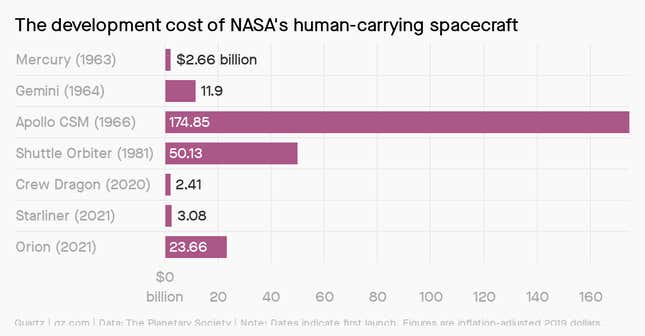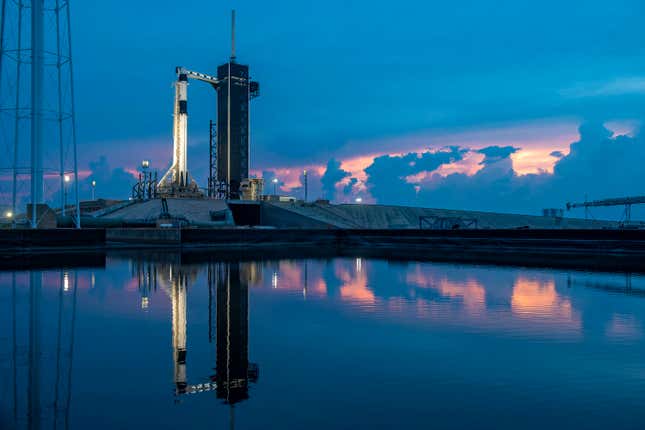Dear readers,
Welcome to Quartz’s newsletter on the economic possibilities of the extraterrestrial sphere. Please forward widely, and let me know what you think. This week: Credit analysis, Virgin Orbit takes a swing, and Russia’s space troubles.
🚀🚀🚀
Well, that was anticlimactic.
Yesterday, NASA and SpaceX scrubbed the first crewed flight of a spacecraft from the US since 2011 due to weather concerns. The two organizations will make another attempt to fly astronauts Doug Hurley and Bob Behnken to the International Space Station on Saturday at 3:22 pm ET, or if necessary, Sunday.
While we wait, let’s dive into the sordid business of who gets to take credit for the return to spaceflight in the US when it happens. Outsourcing spacecraft design to private firms has been controversial, but if SpaceX and Boeing succeed, they will have produced the most affordable human-carrying spacecraft ever.

Start with: It’s an impossible question to answer. Billions of dollars and millions of hours of labor went into the two spacecraft built in the commercial crew program by SpaceX and Boeing. Mobilizing that required elected officials, bureaucrats and business leaders to pull the right levers over a period of at least fourteen years. You can’t put one name on that!
The notion of “necessary” and “sufficient” conditions always comes to mind when working through these questions. Elon Musk and SpaceX were necessary to make this moment possible, but hardly sufficient. Multiple NASA leaders had to take a risk on the idea that private companies could make safe, reliable spacecraft, and put their money and the agency’s expertise behind it.
You can go further down the rabbit hole—for example, if Russia had not invaded Ukraine in 2014, sending the late Senator John McCain on a nearly single-handed crusade to stop the import of Russian rocket engines, would SpaceX have been able to win the lucrative military contracts that helped sustain it through the development of the crew Dragon?
SpaceX execs would tell you of course they would have won the Air Force’s confidence or found a way to complete Dragon, but there have been plenty of speed bumps along the way.
The space community, competitive as it is, tends to come together (at least rhetorically) when it comes to these moments. Boeing, still working to get its commercial crew spacecraft ready for flight, wished SpaceX the best.
So who’s the skunk at the party? President Donald Trump’s campaign used the occasion to attack his predecessor, Barack Obama, and current electoral rival, former vice president Joe Biden, accusing them of neglecting NASA, while taking credit for the upcoming launch.
It’s pretty rich, and false. Let’s not forget that president George W. Bush made the decision to retire the Space Shuttle and begin working with private companies to build new spacecraft. Under Obama, those partnerships were expanded to include crewed flights. The progress thus far under Trump was built on a path set long ago.
There is plenty of debate to be had on space policy between this president and the past one—Obama attempted to cancel a return to the moon, while Trump, notably, has rushed forward a lunar mission to occur before the end of his potential second term, and also created a new military service focused on space. The first has nothing to do with bringing crewed flight back to the US, and the latter has nothing to do with NASA.
NASA has always been a political tool, for the US and for the lawmakers whose districts are the recipients of its investment, and presidents routinely snipe at each other obliquely over big changes in NASA’s mission. But it’s novel to see one president criticizing his predecessor for the same decisions he’s also taking credit for.
🌘 🌘 🌘
Imagery Interlude
The SpaceX Falcon 9 rocket and Dragon capsule on the pad at Cape Canaveral. See you on Saturday!

👀 Read this 👀
If you’re killing time before the launch perusing Netflix’s offerings, you might start to think its curators value quantity over quality. Is this assessment of the streaming giant’s content strategy actually fair? We chart the best and worst of Netflix against its biggest competitors, in our latest field guide on what’s next for Netflix.
🛰🛰🛰
SPACE DEBRIS
Anomaly! Virgin Orbit’s attempt to demonstrate its air-launched rocket went awry over the weekend. The rocket with a dummy payload was successfully released from its carrier plane and ignited its engine before something unexpected happened. Now, engineers will figure out what went wrong. While a bit disappointing, it’s rare to see a rocket succeed on the first try, and Virgin will be back for another bite at the apple.
Round up. SpaceX raised $346 million in new investment, according to SEC filings. Musk’s highly valued rocket company has been raking in cash—some $1.7 billion since the beginning of 2019—and pouring it out again into a series of capital-intensive projects, like its Starlink satellite network, and new space vehicle, called Starship. Worth noting: CNBC’s Michael Sheetz, the most dedicated chronicler of SpaceX’s fundraising, has a new book coming out, co-written with Lori Garver, the former NASA executive who played a critical role in making commercial crew a reality.
Financial Engineering. OneWeb, the bankrupt satellite firm currently trying to sell its assets, has asked the FCC for permission to launch a lot more satellites—48,000 to be exact. The move is seen as a tactic to increase the value of the company’s rights to operate satellites using certain radio spectrum, in part by forcing competitors to plan around OneWeb’s hypothetical constellation. When the company’s licenses come up for auction later this summer, they will be that much more appealing to potential buyers.
You’re in the Army now. Speaking of big satellite networks, SpaceX signed a pilot contract with the US Army to test the capability of its Starlink space internet network. Satellite operators often depend on military and government contracts, while the private sector looks upon government use of a new technology as a seal of approval. So while it is very early days, this is an important step forward for the company’s network, which is also being demoed by the US Air Force.
Whither Roscosmos? Axios spotlights the trouble ahead for Russia’s space agency. The hefty fees paid by NASA to fly astronauts on its Soyuz rocket make up a significant chunk of its annual budget, and if commercial crew gets off the ground, they are about to disappear. That adds to pressure from its dwindling satellite launch business and Russia’s troubled, oil-dependent economy. It all spells difficult times ahead—and that may be trouble for everyone, given the importance of Russia’s role in managing the International Space Station and the desire for international collaboration in any lunar return.
Your pal,
Tim
This was issue 50 of our newsletter. Hope your week is out of this world! Please send your favorite crewed spaceflight playlists, people who deserve credit for commercial crew, tips, and informed opinions to tim@qz.com.